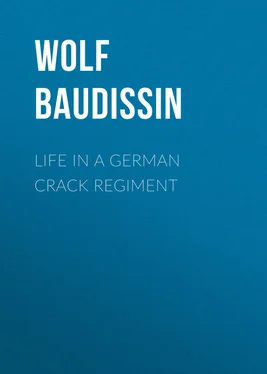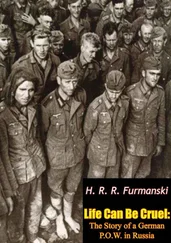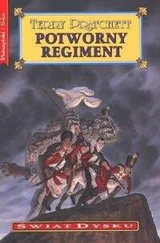Wolf Baudissin - Life in a German Crack Regiment
Здесь есть возможность читать онлайн «Wolf Baudissin - Life in a German Crack Regiment» — ознакомительный отрывок электронной книги совершенно бесплатно, а после прочтения отрывка купить полную версию. В некоторых случаях можно слушать аудио, скачать через торрент в формате fb2 и присутствует краткое содержание. Жанр: foreign_antique, foreign_prose, на английском языке. Описание произведения, (предисловие) а так же отзывы посетителей доступны на портале библиотеки ЛибКат.
- Название:Life in a German Crack Regiment
- Автор:
- Жанр:
- Год:неизвестен
- ISBN:нет данных
- Рейтинг книги:3 / 5. Голосов: 1
-
Избранное:Добавить в избранное
- Отзывы:
-
Ваша оценка:
- 60
- 1
- 2
- 3
- 4
- 5
Life in a German Crack Regiment: краткое содержание, описание и аннотация
Предлагаем к чтению аннотацию, описание, краткое содержание или предисловие (зависит от того, что написал сам автор книги «Life in a German Crack Regiment»). Если вы не нашли необходимую информацию о книге — напишите в комментариях, мы постараемся отыскать её.
Life in a German Crack Regiment — читать онлайн ознакомительный отрывок
Ниже представлен текст книги, разбитый по страницам. Система сохранения места последней прочитанной страницы, позволяет с удобством читать онлайн бесплатно книгу «Life in a German Crack Regiment», без необходимости каждый раз заново искать на чём Вы остановились. Поставьте закладку, и сможете в любой момент перейти на страницу, на которой закончили чтение.
Интервал:
Закладка:
After a slight pause, during which the deepest stillness reigned, the adjutant continued: "The transference of Lieutenant Winkler to our regiment is at the personal request of His Majesty. It behoves us, therefore, not to criticise His Majesty's commands. I beg you to remember this, and to restrain any expressions of opinion."
It was perfectly clear and unmistakable that the adjutant spoke in the name, and at the request of the colonel, and silently one after another retired.
But the silence was far more expressive than words. Dejectedly the "Golden Butterflies" walked about; they had not the spirit to ask their guests to remain when, much earlier than usual, the latter prepared to depart. It was a matter of complete indifference whether they stayed an hour longer or not; the spirit of the thing had vanished; the festivity was ruined. The rooms were soon empty, one after another departed, only the "Golden Butterflies" remained. And they, when at last they were quite alone, asked themselves again, "Why have we deserved this?"
In one corner of the room, all huddled up on a sofa, sat young Willberg, the darling and favourite of all, a young lieutenant of six-and-twenty, whose father had been in the regiment and had won the Iron Cross of the First Class on that memorable day. Young Willberg had evidently indulged somewhat freely in wine; he was in a state of abject misery, and wept and sobbed like a child.
"Willberg, whatever is the matter?" his comrades asked him sympathetically, as they came nearer him.
He raised his face which was usually fresh and youthful-looking, but now the glittering tears ran down his cheeks, and in a heart-breaking tone of voice he sobbed out: "My regiment, my beloved regiment."
Not a single one of those who stood around him could offer him a word of consolation – they were all as mournful as death.
CHAPTER II
Introduced to the Regiment
"To-day at twelve o'clock I desire to speak with the officers in undress uniform."
The colonel's command was communicated to all the officers, and now, full of expectation, they were standing outside the mess-room. To the questions: "What's the matter with the old fellow now? Has anyone got cleaned out?" the answer was immediately given: "Winkler came to-day and is to be introduced to us all."
And this universal answer was followed on each occasion by a universal "Ah" – an expression of the deepest commiseration and the greatest disappointment. Winkler had really come? How many ardent prayers had not been raised to heaven that he would not come! And in his innermost heart each man had still hoped that the order of exchange would be recalled. His Majesty had heard privately, through inquiries of an adjutant, what they thought about this new comrade; they had not concealed their views, but instead of the hoped-for order of recall, the adjutant had one day reappeared, and had quite casually, and in the way of conversation, yet in spite of that, with an official air, given them to understand that His Majesty was very vexed at what he had heard of the officers' views concerning Lieutenant Winkler. His Majesty had expressed his sincerest hope that the regiment would receive their new member with open arms. The adjutant's words had not failed to have effect; not that the officers suddenly changed their views, but they took care not to say what they thought in his presence any more.
Now Winkler had really come. "What does he look like?" "What sort of an impression does he make?" "Has anyone spoken to him?"
There was a torrent of questions. Suddenly it struck twelve, and to the minute the colonel appeared with his adjutant and Lieutenant Winkler.
The first lieutenant motioned the officers to their places, and the colonel immediately began:
"Gentlemen, I have requested you to meet me in order to introduce to you our new comrade, Lieutenant Winkler. Allow me to introduce you, Lieutenant Winkler."
Lieutenant Winkler stepped forward and saluted in a friendly way; he stood there erect and courteous, a man of medium size, slim, yet strong. He was a very well developed man, and the becoming uniform of the "Golden Butterflies," with its rich gold embroidery, suited him excellently; on his young and fresh-looking countenance – he was twenty-seven years of age – with its thick, light moustache, and in his clear, blue eyes, was written energy and independence. Many of the officers there present could scarcely conceal a certain unrest and embarrassment. Winkler's face alone remained absolutely cool.
The "Golden Butterflies" examined their new comrade with searching eyes, just as if they were examining a horse that had been led before them. They cast a glance at his figure, at his legs, looked him over to see if he would do well at a parade march, and whether his outward appearance was equal to the demands which were made on a member of so important a regiment. According as they were satisfied with their examination, they put their hands more or less cordially, or in some cases only a finger, to their caps.
"Lieutenant Winkler," continued the colonel, "a very great honour has been paid you; at the direct request of His Majesty you have been made a member of a regiment which can look back on a glorious past, and whose officers have always been distinguished for the purity of their character, the gallantry of their spirit and their honourable lives, both as soldiers and gentlemen. You come among us from a different garrison, from totally different surroundings. You have been bred and reared in circumstances where people do not hold the same views as we do. It must be your first endeavour to become, in the truest sense of the word, one of us, for the uniform does not make the man, it is the spirit which puts the seal on him. And the financial material circumstances of a man are not without their influence on the esprit de corps of a regiment. You, Lieutenant Winkler, probably have the disposal of an allowance which is so large that it bears no relation to the small amounts which most of my officers have to do with. You, sir, have grown up in a circle where money plays the most important part, where, to a certain extent, the honour in which a man is held depends upon the size of his banking account. But our great pride is that, with our small means, or rather I should say, in spite of our small means, we remain what we are. In course of time you will see for yourself how many of your comrades are obliged to stint themselves merely to make both ends meet, and how they are obliged to deprive themselves of all kinds of things in order to maintain a dignified appearance. Although I am delighted to hear that, while you were living in a small garrison town, you were economical and eschewed all luxuries, now that you are transferred to Berlin I must beg you most earnestly, and warn you most emphatically, to resist the various temptations that will assail you here. Keep to the modest mode of life, and do not fall into the fault, so easy to youth, of boasting of your riches and wealth, and of playing for large stakes with your comrades. If you attend to my admonition, then a friendly and cordial relationship will grow up between you and these gentlemen, to whom you are now a stranger." And, turning to the adjutant, he continued: "Count, I beg you to introduce Lieutenant Winkler now to the individual officers."
The introductions were made strictly according to etiquette, beginning with the lieutenant-colonel and ending with the youngest lieutenant.
It was only when the names of the lieutenants were read out that there was any sign of life in Winkler's bearing. During the colonel's long speech, and while the names of his superior officers were being read, he stood immovable, his hand in the attitude of salute – and everyone had to admit that he stood well – without moving or swerving. His face was so well under control that not a muscle moved, and not a line on his countenance betrayed what he felt at the colonel's remarks. When the names of the lieutenants were given – he saluted the first lieutenants as his superiors – his bearing relaxed somewhat, and he returned the salutes of his comrades cordially. And he saluted well – everybody had to admit that likewise.
Читать дальшеИнтервал:
Закладка:
Похожие книги на «Life in a German Crack Regiment»
Представляем Вашему вниманию похожие книги на «Life in a German Crack Regiment» списком для выбора. Мы отобрали схожую по названию и смыслу литературу в надежде предоставить читателям больше вариантов отыскать новые, интересные, ещё непрочитанные произведения.
Обсуждение, отзывы о книге «Life in a German Crack Regiment» и просто собственные мнения читателей. Оставьте ваши комментарии, напишите, что Вы думаете о произведении, его смысле или главных героях. Укажите что конкретно понравилось, а что нет, и почему Вы так считаете.












